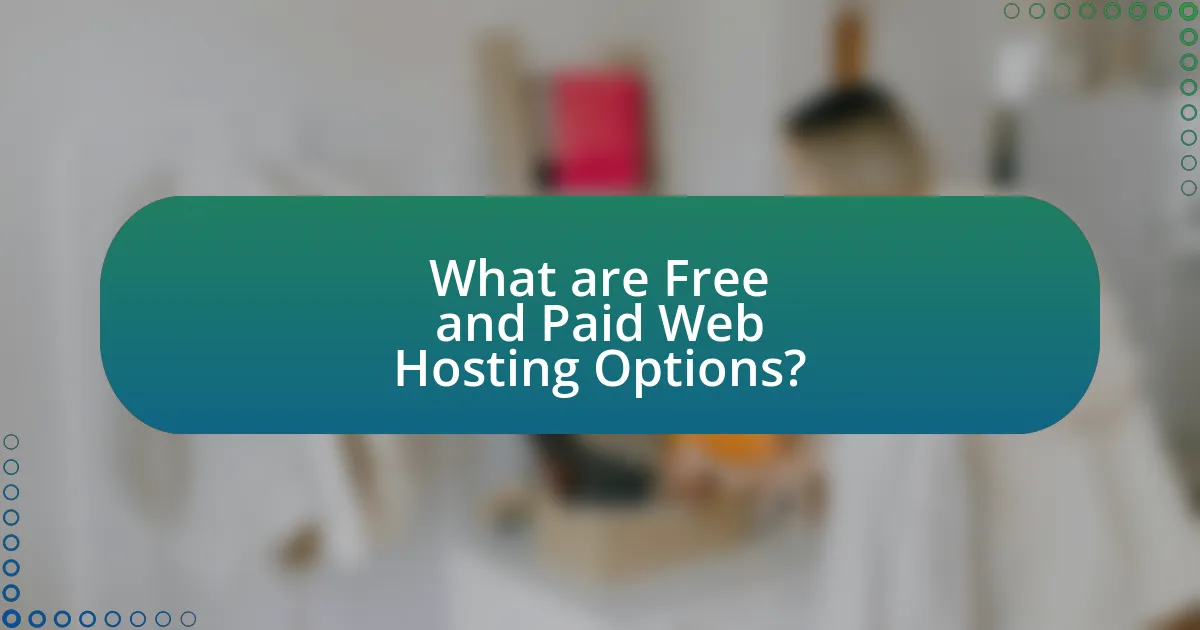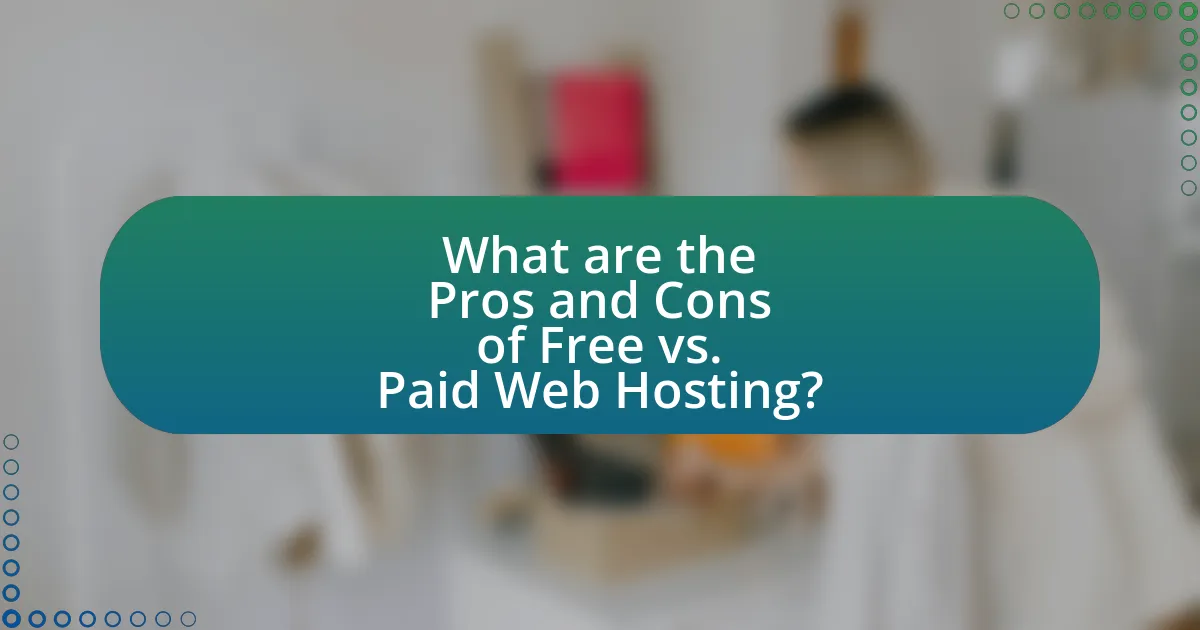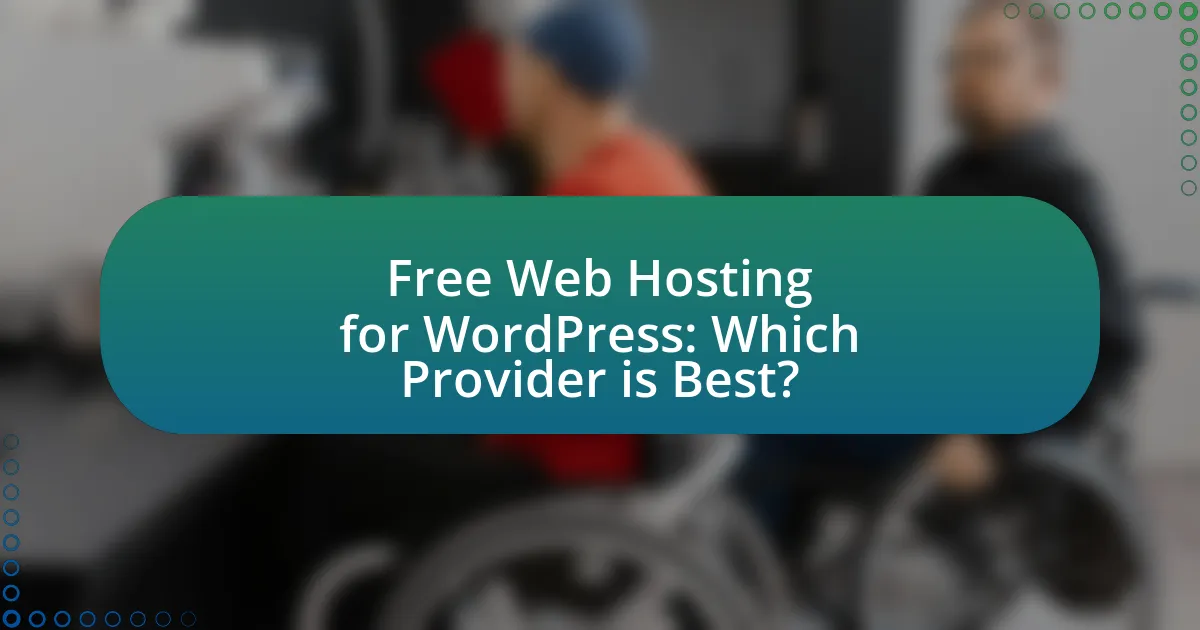The article provides a detailed comparison of free and paid web hosting options, highlighting their respective features, limitations, and performance metrics. Free web hosting services offer basic functionalities at no cost but often come with restrictions such as limited storage, bandwidth, and customer support, making them less suitable for professional use. In contrast, paid web hosting options require a subscription fee and typically provide enhanced features, better performance, and dedicated support, which are crucial for businesses and serious web projects. The article also discusses factors influencing the choice between the two, including reliability, scalability, and user needs, while outlining the pros and cons of each hosting type.

What are Free and Paid Web Hosting Options?
Free web hosting options provide basic services at no cost, often with limitations such as storage space, bandwidth, and features. Examples include platforms like WordPress.com and Wix, which offer free plans but may display ads and restrict customization. Paid web hosting options, on the other hand, require a subscription fee and typically offer enhanced features, greater storage, and better customer support. Providers like Bluehost and SiteGround offer various plans that include domain registration, SSL certificates, and no ads, catering to businesses and individuals seeking more control and reliability.
How do Free Web Hosting Options work?
Free web hosting options provide users with a platform to host their websites without incurring costs. These services typically generate revenue through advertisements displayed on users’ sites, limited storage, and bandwidth, or by offering premium upgrades for additional features. For instance, companies like WordPress.com and Wix offer free plans that include basic functionalities but may restrict customization and impose branding on the user’s site. This model allows users to create and maintain a web presence at no financial cost, albeit with limitations compared to paid hosting services.
What limitations do Free Web Hosting Options typically have?
Free web hosting options typically have limitations such as restricted storage space, bandwidth caps, and lack of customer support. These services often provide minimal resources, which can hinder website performance and scalability. For instance, many free hosting providers limit storage to a few hundred megabytes and impose bandwidth restrictions that can lead to slow loading times or downtime during high traffic periods. Additionally, free hosting often lacks essential features like custom domain names, SSL certificates, and advanced security measures, making them less suitable for professional or business use. Furthermore, users may encounter advertisements placed by the hosting provider on their websites, which can detract from the user experience and brand image.
How does the performance of Free Web Hosting compare to Paid Options?
Free web hosting typically offers lower performance compared to paid options. Paid web hosting services generally provide faster loading times, better uptime reliability, and enhanced security features. For instance, a study by HostingFacts found that paid hosting services can achieve uptime rates of 99.9% or higher, while free hosting often struggles to maintain consistent uptime, sometimes dropping below 90%. Additionally, paid options often include dedicated resources, which lead to improved site speed and performance under high traffic conditions, whereas free hosting may impose bandwidth limits and resource sharing that can slow down websites.
What are the key features of Paid Web Hosting Options?
Paid web hosting options typically offer enhanced features such as increased storage capacity, higher bandwidth limits, and improved security measures. These features are crucial for businesses and individuals who require reliable performance and support. For instance, paid hosting often includes dedicated customer support, which can significantly reduce downtime and technical issues. Additionally, many paid plans provide access to advanced tools like website builders, content management systems, and analytics, which are essential for optimizing online presence. Furthermore, paid hosting services frequently offer better uptime guarantees, often exceeding 99.9%, ensuring that websites remain accessible to users.
How do Paid Web Hosting Options enhance website performance?
Paid web hosting options enhance website performance by providing dedicated resources, faster server speeds, and improved uptime reliability. Unlike free hosting, which often shares resources among multiple users, paid hosting allocates specific bandwidth and storage to each website, resulting in quicker load times and better handling of traffic spikes. Additionally, paid services typically offer advanced technologies such as SSD storage and content delivery networks (CDNs), which further optimize speed and performance. Research indicates that websites hosted on paid platforms experience up to 99.9% uptime, significantly reducing the risk of downtime compared to free hosting alternatives.
What additional services do Paid Web Hosting Options provide?
Paid web hosting options provide additional services such as enhanced security features, dedicated customer support, and increased storage and bandwidth. These services are designed to improve website performance and reliability. For instance, paid hosting often includes SSL certificates for secure data transmission, daily backups to prevent data loss, and content delivery networks (CDNs) to speed up content delivery. Furthermore, many paid plans offer website builders and marketing tools, which facilitate easier site creation and promotion. These features are typically absent or limited in free hosting options, making paid services more suitable for businesses and serious web projects.
Why choose one over the other?
Choosing paid web hosting over free web hosting is often preferred due to the reliability and performance it offers. Paid hosting typically provides better uptime, faster loading speeds, and enhanced security features, which are crucial for maintaining a professional online presence. For instance, a study by HostingFacts found that paid hosting services boast an average uptime of 99.9%, while free hosting services often experience significant downtime. Additionally, paid options usually include customer support, which is essential for resolving technical issues promptly, whereas free services may lack adequate support. Thus, the advantages of reliability, speed, security, and support make paid web hosting a more favorable choice for serious website owners.
What factors should influence the decision between Free and Paid Web Hosting?
The decision between Free and Paid Web Hosting should be influenced by factors such as reliability, support, features, and scalability. Reliability is crucial, as paid hosting typically offers better uptime guarantees, often exceeding 99.9%, compared to free hosting, which may have frequent downtimes. Support is another significant factor; paid hosting usually provides 24/7 customer service, while free hosting often lacks adequate support channels. Features such as storage space, bandwidth, and security measures are generally more robust in paid plans, with many offering SSL certificates and backups, which are often absent in free options. Lastly, scalability is important for growth; paid hosting allows for easy upgrades as traffic increases, whereas free hosting may impose limitations that hinder expansion.
How do user needs affect the choice of Web Hosting Options?
User needs significantly influence the choice of web hosting options by determining the required features, performance, and budget. For instance, businesses seeking high reliability and customer support typically opt for paid hosting services, which offer guaranteed uptime and technical assistance, while individuals or small projects may choose free hosting due to budget constraints. According to a survey by HostingAdvice, 70% of users prioritize customer support and uptime when selecting a hosting provider, highlighting that user needs directly correlate with the decision-making process in web hosting.

What are the Pros and Cons of Free vs. Paid Web Hosting?
Free web hosting offers no cost, making it accessible for beginners and small projects, but it often comes with limitations such as restricted bandwidth, lack of customer support, and potential ads on the site. In contrast, paid web hosting provides enhanced features like greater storage, improved performance, dedicated support, and no advertisements, but it requires a financial investment, which can be a barrier for some users. The choice between free and paid hosting ultimately depends on the specific needs and budget of the user, with free hosting being suitable for personal or experimental sites, while paid hosting is better for professional or business purposes.
What are the advantages of Free Web Hosting?
Free web hosting offers several advantages, primarily cost savings, as it allows users to create and maintain a website without incurring any financial expenses. This is particularly beneficial for individuals, small businesses, or startups with limited budgets who want to establish an online presence. Additionally, free web hosting services often provide user-friendly interfaces and basic features that enable users to set up websites quickly and easily, making it accessible for those without technical expertise. Furthermore, many free hosting providers include essential tools such as website builders and templates, which facilitate the design process. These advantages make free web hosting an attractive option for users seeking to test ideas or create personal projects without financial commitment.
How can Free Web Hosting be beneficial for beginners?
Free web hosting can be beneficial for beginners by providing a cost-effective platform to learn web development and online presence management. This allows newcomers to experiment with website creation, design, and functionality without financial risk. According to a survey by HostingAdvice, 70% of new website owners prefer free hosting to test their ideas before investing in paid services. Additionally, free web hosting often includes user-friendly tools and templates, which simplify the learning curve for those unfamiliar with coding or web design.
What are the cost-saving benefits of Free Web Hosting?
Free web hosting provides significant cost-saving benefits by eliminating monthly fees associated with paid hosting services. Users can save money on server maintenance, technical support, and domain registration, as many free hosting providers offer these services at no charge. For instance, platforms like WordPress.com and Wix allow users to create websites without upfront costs, making them accessible for individuals and small businesses with limited budgets. Additionally, free web hosting often includes basic features that are sufficient for personal projects or small-scale websites, further reducing the need for investment in premium services.
What are the disadvantages of Free Web Hosting?
Free web hosting has several disadvantages, primarily including limited resources, lack of customer support, and potential security risks. Users often face restrictions on bandwidth and storage, which can hinder website performance and growth. Additionally, free hosting services typically do not offer reliable customer support, leaving users without assistance during technical issues. Security is another concern, as free hosting providers may not implement robust security measures, making websites vulnerable to attacks. Furthermore, free web hosting often includes advertisements, which can detract from the user experience and brand image. These factors collectively make free web hosting less suitable for serious or business-oriented websites.
How does advertising impact Free Web Hosting users?
Advertising significantly impacts Free Web Hosting users by introducing limitations and influencing user experience. Free web hosting services often rely on advertising revenue, which can lead to intrusive ads on users’ websites, detracting from the site’s professionalism and user engagement. According to a study by HostingAdvice, 70% of users reported that excessive ads on free hosting platforms negatively affected their perception of the website’s credibility. Additionally, these ads can slow down website loading times, further diminishing user satisfaction and retention. Thus, while free web hosting may seem cost-effective, the presence of advertising can compromise the overall quality and effectiveness of the user experience.
What security risks are associated with Free Web Hosting?
Free web hosting poses significant security risks, including data breaches, malware infections, and lack of support for security updates. These platforms often have inadequate security measures, making them vulnerable to attacks. For instance, a study by the University of Maryland found that websites hosted on free platforms are 50% more likely to be compromised than those on paid services. Additionally, free hosting providers may not offer SSL certificates, leaving data transmitted between users and the site unencrypted. This lack of encryption can lead to sensitive information being intercepted by malicious actors. Furthermore, free hosting services often have limited customer support, which can delay the response to security incidents, exacerbating the risks.
What are the advantages of Paid Web Hosting?
Paid web hosting offers several advantages, including enhanced performance, reliability, and customer support. Unlike free hosting, paid services typically provide dedicated resources, resulting in faster loading times and better uptime, which is crucial for maintaining user engagement and search engine rankings. Additionally, paid hosting often includes features such as custom domain names, increased storage, and advanced security measures, which are essential for professional websites. According to a study by HostingAdvice, 99.9% uptime is common among reputable paid hosting providers, significantly outperforming free options that may experience frequent downtimes. Furthermore, paid hosting services usually offer 24/7 customer support, ensuring that technical issues can be resolved promptly, which is not typically available with free hosting solutions.
How does customer support differ in Paid Web Hosting?
Customer support in paid web hosting is typically more comprehensive and responsive compared to free web hosting services. Paid web hosting providers often offer 24/7 customer support through multiple channels such as live chat, phone, and email, ensuring that users can receive assistance at any time. In contrast, free web hosting services may provide limited support, often relying on community forums or documentation, which can lead to longer resolution times for issues. Additionally, paid services frequently have dedicated support teams with specialized knowledge, enhancing the quality of assistance provided. This difference in support quality is crucial for businesses that rely on uptime and quick problem resolution to maintain their online presence.
What scalability options do Paid Web Hosting services offer?
Paid web hosting services offer several scalability options, including shared hosting, VPS (Virtual Private Server) hosting, dedicated server hosting, and cloud hosting. Shared hosting allows users to start with minimal resources and upgrade to VPS or dedicated servers as traffic increases. VPS hosting provides more resources and control, enabling users to scale up their server specifications. Dedicated server hosting offers maximum performance and customization for high-traffic websites. Cloud hosting allows for dynamic resource allocation, enabling users to scale resources up or down based on demand, ensuring optimal performance during traffic spikes. These options cater to varying needs, allowing businesses to grow without significant downtime or migration issues.
What are the disadvantages of Paid Web Hosting?
Paid web hosting has several disadvantages, including higher costs, potential for vendor lock-in, and limited flexibility. The financial burden of monthly or annual fees can be significant, especially for small businesses or individuals with tight budgets. Additionally, many paid hosting services may require long-term contracts, making it difficult to switch providers without incurring penalties. Furthermore, some paid hosting plans may restrict the ability to customize server settings or install specific software, limiting the user’s control over their hosting environment. These factors can lead to dissatisfaction if the service does not meet expectations or if the user’s needs change over time.
How can the cost of Paid Web Hosting be a barrier for some users?
The cost of paid web hosting can be a barrier for some users due to its financial implications, which may exceed their budget constraints. Many individuals and small businesses often operate with limited resources, making it difficult to allocate funds for hosting services that can range from $5 to $500 per month, depending on the features and performance required. According to a survey by Clutch, 30% of small businesses reported that cost is a significant factor when choosing a web hosting service. This financial burden can deter users from opting for paid services, leading them to rely on free hosting options that may lack essential features, security, and support.
What are the potential complexities of managing Paid Web Hosting?
Managing paid web hosting involves several complexities, including cost management, technical support, and resource allocation. Cost management requires careful budgeting to account for recurring fees, potential overages, and upgrades, which can escalate if not monitored. Technical support complexity arises from the need to understand various hosting features and configurations, as well as the necessity of troubleshooting issues that may arise, often requiring specialized knowledge. Resource allocation complexity includes managing bandwidth, storage, and server performance to ensure optimal website functionality, which can be challenging as traffic and data needs grow. These complexities highlight the importance of strategic planning and ongoing management in a paid web hosting environment.

How to Choose Between Free and Paid Web Hosting?
To choose between free and paid web hosting, evaluate your website’s needs against the limitations of free hosting services. Free web hosting often comes with restrictions such as limited bandwidth, storage, and lack of customer support, which can hinder website performance and reliability. In contrast, paid web hosting typically offers enhanced features like greater storage capacity, better security, and dedicated customer support, which are crucial for business growth and user experience. For instance, a study by HostingAdvice found that 70% of users experienced downtime with free hosting, while paid services reported uptime rates of over 99.9%. Therefore, if your website requires reliability and scalability, opting for paid hosting is advisable.
What criteria should be considered when selecting Web Hosting?
When selecting web hosting, key criteria include reliability, performance, customer support, scalability, security, and pricing. Reliability is crucial as it ensures minimal downtime; for instance, a hosting provider with a 99.9% uptime guarantee is preferable. Performance relates to speed and server response times, which can significantly impact user experience and SEO rankings. Customer support should be accessible and responsive, ideally offering 24/7 assistance through multiple channels. Scalability allows for growth without needing to switch providers, making it essential for businesses anticipating increased traffic. Security features, such as SSL certificates and regular backups, protect data and enhance trust. Finally, pricing should align with the budget while considering the features offered, as some paid options provide better value through enhanced services compared to free hosting.
How important is website purpose in choosing Web Hosting?
Website purpose is crucial in choosing web hosting, as it directly influences the type of hosting required. For instance, a business website typically demands higher reliability, security, and support, which are often found in paid hosting options, while a personal blog may suffice with free hosting. According to a study by HostingAdvice, 70% of businesses reported that their website’s performance improved significantly after switching to a hosting plan tailored to their specific needs. This demonstrates that aligning hosting choices with website purpose enhances functionality and user experience.
What role does budget play in the decision-making process?
Budget plays a critical role in the decision-making process by determining the financial resources available for various options. In the context of web hosting, a budget influences whether an individual or organization opts for free or paid hosting services. For instance, free web hosting may appeal to those with limited budgets, but it often comes with restrictions such as limited storage, bandwidth, and support. Conversely, a budget that allows for paid hosting can provide enhanced features, better performance, and customer support, which are essential for businesses aiming for growth and reliability. Research indicates that 70% of businesses that invest in paid hosting report improved website performance and user satisfaction, underscoring the importance of budget in making informed decisions.
What are the best practices for evaluating Web Hosting Options?
The best practices for evaluating web hosting options include assessing performance, reliability, customer support, pricing, and scalability. Performance can be evaluated through uptime guarantees and speed tests, with reputable hosts typically offering at least 99.9% uptime. Reliability is crucial; look for hosts with a proven track record and positive user reviews. Customer support should be available 24/7 via multiple channels, such as live chat, phone, and email, ensuring assistance when needed. Pricing should be transparent, with no hidden fees, and it’s important to compare the features offered at different price points. Scalability is essential for future growth; choose a host that allows easy upgrades to accommodate increased traffic or resource needs. These practices ensure a well-informed decision when selecting a web hosting provider.
How can user reviews influence the choice of Web Hosting?
User reviews significantly influence the choice of web hosting by providing real-world insights into performance, reliability, and customer service. Potential customers often rely on these reviews to gauge the experiences of others, which can highlight strengths and weaknesses of various hosting providers. For instance, a study by BrightLocal found that 91% of consumers read online reviews, and 84% trust them as much as personal recommendations. This trust in user feedback can lead to increased confidence in selecting a hosting service that meets specific needs, ultimately impacting decision-making in the competitive landscape of free versus paid web hosting options.
What tools can help compare Free and Paid Web Hosting services?
Several tools can effectively compare free and paid web hosting services, including HostAdvice, G2, and Capterra. HostAdvice provides user reviews and expert ratings, allowing users to evaluate performance, uptime, and customer support across various hosting providers. G2 aggregates user feedback and offers comparison charts that highlight features, pricing, and user satisfaction. Capterra similarly compiles user reviews and provides side-by-side comparisons of hosting services, focusing on key metrics such as pricing, features, and customer ratings. These tools facilitate informed decision-making by presenting comprehensive data on both free and paid options.
What tips can help users make an informed decision?
To make an informed decision between free and paid web hosting options, users should evaluate their specific needs, including website purpose, expected traffic, and budget. Understanding the limitations of free hosting, such as bandwidth restrictions and lack of customer support, is crucial, as these factors can impact website performance and reliability. Additionally, users should compare features like storage space, domain name availability, and security measures offered by both options. Researching user reviews and expert opinions can provide insights into the reliability and performance of various hosting services, helping users choose a provider that aligns with their requirements.
How can users assess their long-term needs for Web Hosting?
Users can assess their long-term needs for web hosting by evaluating their website’s projected growth, traffic expectations, and specific functionality requirements. Analyzing current and future content demands, such as the need for e-commerce capabilities or multimedia support, helps determine the appropriate hosting plan. Additionally, users should consider the scalability of hosting options, as a study by HostingAdvice indicates that 70% of websites experience growth in traffic over time, necessitating a hosting solution that can adapt to increased demands. By reviewing these factors, users can make informed decisions about whether to choose free or paid hosting services based on their long-term objectives.
What common mistakes should be avoided when choosing Web Hosting?
When choosing web hosting, common mistakes to avoid include selecting a provider based solely on price, overlooking the importance of customer support, and failing to assess scalability options. Many individuals prioritize low costs without considering that cheaper options may lack essential features or reliability, which can lead to downtime and lost revenue. Additionally, inadequate customer support can hinder problem resolution, as studies show that 70% of customers abandon a brand due to poor service. Lastly, not evaluating scalability can restrict future growth; a report from HostingAdvice indicates that 60% of businesses outgrow their initial hosting plans within two years.



